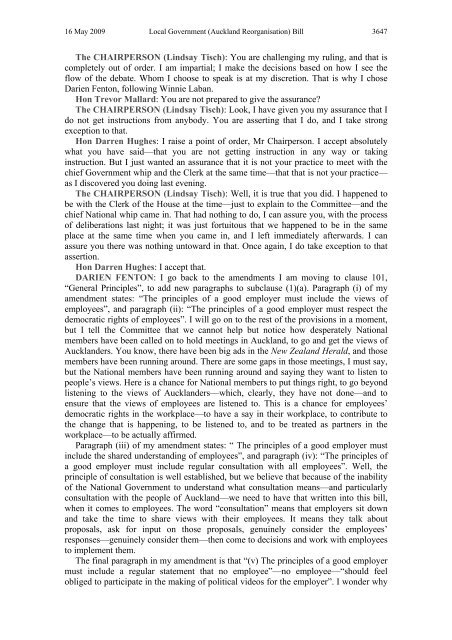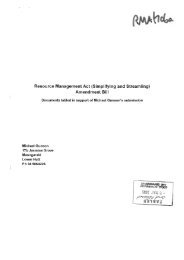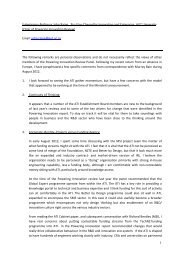Parliamentary Debates (Hansard) - New Zealand Parliament
Parliamentary Debates (Hansard) - New Zealand Parliament
Parliamentary Debates (Hansard) - New Zealand Parliament
Create successful ePaper yourself
Turn your PDF publications into a flip-book with our unique Google optimized e-Paper software.
16 May 2009 Local Government (Auckland Reorganisation) Bill 3647<br />
The CHAIRPERSON (Lindsay Tisch): You are challenging my ruling, and that is<br />
completely out of order. I am impartial; I make the decisions based on how I see the<br />
flow of the debate. Whom I choose to speak is at my discretion. That is why I chose<br />
Darien Fenton, following Winnie Laban.<br />
Hon Trevor Mallard: You are not prepared to give the assurance?<br />
The CHAIRPERSON (Lindsay Tisch): Look, I have given you my assurance that I<br />
do not get instructions from anybody. You are asserting that I do, and I take strong<br />
exception to that.<br />
Hon Darren Hughes: I raise a point of order, Mr Chairperson. I accept absolutely<br />
what you have said—that you are not getting instruction in any way or taking<br />
instruction. But I just wanted an assurance that it is not your practice to meet with the<br />
chief Government whip and the Clerk at the same time—that that is not your practice—<br />
as I discovered you doing last evening.<br />
The CHAIRPERSON (Lindsay Tisch): Well, it is true that you did. I happened to<br />
be with the Clerk of the House at the time—just to explain to the Committee—and the<br />
chief National whip came in. That had nothing to do, I can assure you, with the process<br />
of deliberations last night; it was just fortuitous that we happened to be in the same<br />
place at the same time when you came in, and I left immediately afterwards. I can<br />
assure you there was nothing untoward in that. Once again, I do take exception to that<br />
assertion.<br />
Hon Darren Hughes: I accept that.<br />
DARIEN FENTON: I go back to the amendments I am moving to clause 101,<br />
“General Principles”, to add new paragraphs to subclause (1)(a). Paragraph (i) of my<br />
amendment states: “The principles of a good employer must include the views of<br />
employees”, and paragraph (ii): “The principles of a good employer must respect the<br />
democratic rights of employees”. I will go on to the rest of the provisions in a moment,<br />
but I tell the Committee that we cannot help but notice how desperately National<br />
members have been called on to hold meetings in Auckland, to go and get the views of<br />
Aucklanders. You know, there have been big ads in the <strong>New</strong> <strong>Zealand</strong> Herald, and those<br />
members have been running around. There are some gaps in those meetings, I must say,<br />
but the National members have been running around and saying they want to listen to<br />
people’s views. Here is a chance for National members to put things right, to go beyond<br />
listening to the views of Aucklanders—which, clearly, they have not done—and to<br />
ensure that the views of employees are listened to. This is a chance for employees’<br />
democratic rights in the workplace—to have a say in their workplace, to contribute to<br />
the change that is happening, to be listened to, and to be treated as partners in the<br />
workplace—to be actually affirmed.<br />
Paragraph (iii) of my amendment states: “ The principles of a good employer must<br />
include the shared understanding of employees”, and paragraph (iv): “The principles of<br />
a good employer must include regular consultation with all employees”. Well, the<br />
principle of consultation is well established, but we believe that because of the inability<br />
of the National Government to understand what consultation means—and particularly<br />
consultation with the people of Auckland—we need to have that written into this bill,<br />
when it comes to employees. The word “consultation” means that employers sit down<br />
and take the time to share views with their employees. It means they talk about<br />
proposals, ask for input on those proposals, genuinely consider the employees’<br />
responses—genuinely consider them—then come to decisions and work with employees<br />
to implement them.<br />
The final paragraph in my amendment is that “(v) The principles of a good employer<br />
must include a regular statement that no employee”—no employee—“should feel<br />
obliged to participate in the making of political videos for the employer”. I wonder why






![Full evidence text [PDF 8908k] - New Zealand Parliament](https://img.yumpu.com/14025494/1/184x260/full-evidence-text-pdf-8908k-new-zealand-parliament.jpg?quality=85)
![−3 JUN 2009 IRELEASED] - New Zealand Parliament](https://img.yumpu.com/12829724/1/185x260/3-jun-2009-ireleased-new-zealand-parliament.jpg?quality=85)
![Full paper text [PDF 3515k] - New Zealand Parliament](https://img.yumpu.com/11267192/1/184x260/full-paper-text-pdf-3515k-new-zealand-parliament.jpg?quality=85)


![Full evidence text [PDF 9k] - Parliament](https://img.yumpu.com/7938085/1/184x260/full-evidence-text-pdf-9k-parliament.jpg?quality=85)





